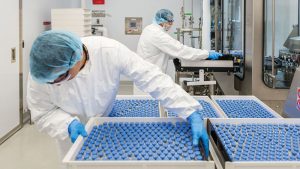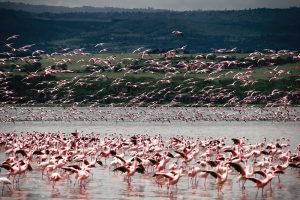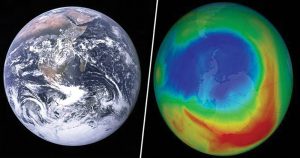Some Good News
 On Thursday 14th May it was announced that Public Health England had approved its first antibodies test, which could detect if people had already had the Coronavirus and therefore suggest if they are now immune to it. These tests were then rolled out to NHS health and social care workers.
On Thursday 14th May it was announced that Public Health England had approved its first antibodies test, which could detect if people had already had the Coronavirus and therefore suggest if they are now immune to it. These tests were then rolled out to NHS health and social care workers.
Further good news followed on the 26th with the green light given to an antiviral drug called remdesivir. Previously used in the treatment of Hepatitis C and Ebola initial trials on COVID-19 patients showed that it reduced the length of time they experienced symptoms from 15 to 11 days. All this without the helpful medical tips from President Trump!
the 26th with the green light given to an antiviral drug called remdesivir. Previously used in the treatment of Hepatitis C and Ebola initial trials on COVID-19 patients showed that it reduced the length of time they experienced symptoms from 15 to 11 days. All this without the helpful medical tips from President Trump!
Most countries are in far better shape as regards flattening the curve of the pandemic and we see glimmers of hope with restrictions lifted both here in Thailand and abroad. Although there is still a long way to go until the end of this virus, there have been some interesting developments whilst we have been suffering from it.
World wide satellite imagery shows amazing reductions in air pollution over countries where traffic has been limited. CO2 emissions dropped 17 percent in April to levels not seen since 2006.
Undoubtedly the reduction in pollution has been caused through planes being grounded and there being fewer cars on the road.Air pollution is plummeting everywhere and according to CNN, locals in the Punjab region of India have been able to see the Himalayas for the first time in decades.
Also,with fewer humans out and about, animals have benefited. For example in India, it has been estimated that there are currently 25% more flamingoes than is usual at this time of year. They have flocked in their thousands to lakes which they light up in pink.  Whilst here in Thailand the endangered Leatherbacks (the world’s biggest sea turtles) have reaped the rewards of fewer tourists. The largest number of nests have been found in two decades on beaches bereft of people because of the coronavirus pandemic.
Whilst here in Thailand the endangered Leatherbacks (the world’s biggest sea turtles) have reaped the rewards of fewer tourists. The largest number of nests have been found in two decades on beaches bereft of people because of the coronavirus pandemic.
Scientists have also confirmed that the ozone layer, which we have been damaging for a long time now, is actually repairing itself.
In 1987 the “Montreal Protocol” was introduced its aim being the discontinuation of specific substances that caused drastic damage such as refrigerants, aerosol spray propellants and industrial solvents..Also concentrations of nitrogen oxides have gone down by as much as one half in some industrial centers since the onset of the pandemic.
 Of course these glimpses of silver linings for the planet do not make up for the devastation of the COVID-19 pandemic. However the global health disaster we are all living through has given us the opportunity to assess which aspects of modern life are absolutely necessary, and what positive changes might be possible.
Of course these glimpses of silver linings for the planet do not make up for the devastation of the COVID-19 pandemic. However the global health disaster we are all living through has given us the opportunity to assess which aspects of modern life are absolutely necessary, and what positive changes might be possible.
During quarantine we have all been forced to be alone with our thoughts for a little while and to put into perspective what is important. It will be interesting to see in the next few years whether we continue with our slavish following of the major conglomerates and international brands. Or whether we look instead to supporting our local businesses and neighbours?
For family, loved ones and those who care for them is something we have all come to realise is of the utmost importance.
